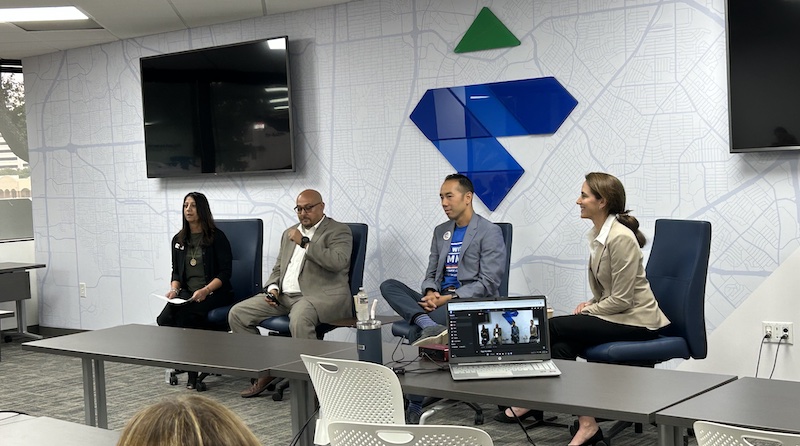Dallas ISD Trustee District 2 Candidates Talk School Choice on Forum
The three candidates for the Dallas ISD Board of Trustees District 2 seat discussed their views on school choice and the Texas Parental Bill of Rights on an April 18 forum.
The North Dallas Chamber of Commerce hosted Sarah Weinberg, Kevin Malonson, and Jimmy Tran, who are running to represent Preston Hollow.
“Public school is a cornerstone of our democracy,” Weinberg said. “It’s critical that we have a great public school system here in Dallas.”
Weinberg’s campaign focuses on prioritizing student outcomes, enlisting parent and community involvement, driving innovation, ensuring school safety and security, and more. Her involvement in Dallas ISD prior to running includes serving as the chief strategy officer for United to Learn, a nonprofit that connects 50 Dallas ISD schools to resources and the community to accelerate student achievement. She and her family also volunteer within District 2.
“I believe all kids deserve this opportunity for a transformational education so that there can be a generational impact on their lives and on their family’s lives,” Weinberg said.
Malonson, former Dallas ISD Single Gender Education coordinator, is also running for the seat, with campaign goals of supporting teachers, expanding Dallas ISD school choice, providing support and equity for special populations, and having transparent governance and fiscal responsibility. He has one child in Dallas ISD and one who is a graduate.
“Education and the opportunity that we provide for young students to have a path to a sustainable life is the reason that I’m here today,” Malonson said. “That is what motivates me and what guides me.”
Tran, Parent Advocates for Dallas ISD co-founder and former Dallas ISD Bond Committee member, completes the trio of candidates with campaign goals of focusing on student success, ensuring governance and accountability, and removing barriers to student progress.
“Public education is what created a better future for me,” Tran said. “Today, as I look and participate in Dallas ISD schools, we are failing students every single day. Dallas ISD has made tremendous progress, but there is room to grow.”
Moderator Mita Havlick, Dallas Education Foundation executive director, asked the candidates how they plan to encourage families to stay within the district, explaining that many families opt for choice and magnet schools when their child reaches middle school.
“We need to be the public school district of choice,” Weinberg said. “Our schools need to be schools folks choose because our outcomes are so strong.”
Tran emphasized that Dallas ISD’s reputation and perception need to change from negative to positive. He also noted that adding more choice programs to middle schools, such as IB, encourages students to stay.
“People still think of Dallas ISD as a quote-unquote bad school,” Tran said. “You know, many of our friends and cohorts, when they hear that Lisa (Tran’s wife) and I have our kids in Dallas ISD, they look at us like we have a third eye.”
Malonson expanded on choice programs in his response, adding that having flexibility with choice programs allows students to forge their own career paths through high school. He also suggested Dallas ISD should consider a pre-K to eighth-grade model, drawing from his child’s experience at George B. Dealey Montessori Academy.
“We need to make sure that there are viable career pathways that start in middle school with advising,” Malonson said. “So that kids know by the time they get to high school what kind of career they want to go into.”
Following the subject of school choice, the candidates each voiced their opposition to the school vouchers, a part of Gov. Greg Abbott’s Parental Bill of Rights.
“[Vouchers] will signal the death note of public education in our state,” Malonson said.
To allow parents more rights as decision-makers, Abbott plans to provide parents who want to pull their child out of public education with $8,000 to cover homeschooling expenses or enroll their children in private schools.
“This is not about school choice,” Tran said. “This is about giving certain individuals an extra $1,000 in their pocket. That $8,000 means there [are] less seats in the classroom, which means less funding for public schools.”
Election Day is May 6, and early voting will run from April 24 to May 2.





